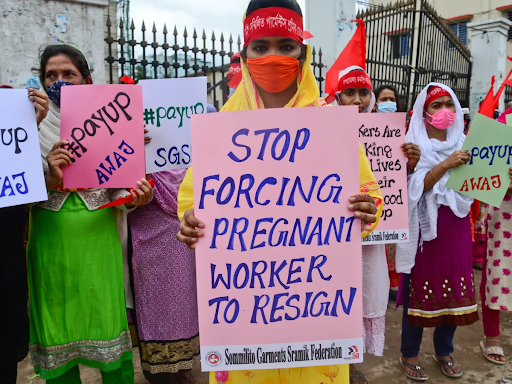 |
Rokiur Jaman Riaj |
Bangladesh’s
ready-made garment (RMG) sector employs over four million workers and
contributes significantly to the country’s GDP and export revenue. Approximately
60% of the workforce are women, many of whom are of reproductive age. Despite
the country’s formal commitment to protecting maternity rights under national
and international law, workplace discrimination against pregnant workers
remains alarmingly widespread. A disjunction between legal guarantees and
ground-level implementation leaves thousands of women vulnerable to
exploitation and dismissal at one of the most critical stages of their lives.
The
primary legal safeguard is the Bangladesh
Labour Act, 2006 (amended in 2013 and 2018). Sections 45 to 50 of the
Act explicitly mandate 16 weeks of paid
maternity leave, to be equally divided before and after childbirth.
Additionally, Section 46 prohibits the dismissal or termination of a woman
during maternity leave and affirms her right to resume work after the leave
period. The law applies to all establishments with more than 50 workers,
including those in the RMG sector. Non-compliance is punishable with fines
under Section 307.
 |
| Image Source: The Guardian |
On
the international front, Bangladesh has ratified ILO Convention No. 111 (Discrimination in Employment and Occupation)
and partially adheres to ILO Convention
No. 183 (Maternity Protection), which calls for a minimum of 14 weeks'
paid leave and protection from dismissal during maternity.
However,
a 2023 report by Karmojibi Nari,
a women workers’ rights organization, revealed that only about one-third of garment factories in Dhaka and surrounding
areas comply with the maternity benefit provisions of the Labour Act. Many factories
operate informally or use short-term contracts to skirt their legal
obligations, particularly regarding maternity leave. This has created a
disturbing culture in which pregnancy is not celebrated but penalized.
In
one telling case study from 2022,
the NGO BLAST (Bangladesh Legal Aid and Services Trust) represented Aklima Begum, a sewing operator in a
mid-sized garment factory in Narayanganj. After notifying her employer of her
pregnancy, Aklima was verbally instructed to resign or face termination. When
she refused, her workload was intensified, and she was publicly humiliated for
her slower performance. Eventually, she was dismissed on the pretext of
absenteeism, despite submitting valid medical certificates. Aklima sought legal
redress through BLAST, and after months of litigation and advocacy, she
received her entitled maternity benefits—though she was not reinstated. Her
case highlights both the strength of
legal provisions and the challenges
of enforcement and retaliation.
 |
| Image Source: BLAST |
The
case underscores a systemic issue: lack of regulatory enforcement. The Department of Inspection for Factories and
Establishments (DIFE) is the primary body responsible for ensuring
compliance. Yet, with fewer than 400 inspectors covering over 30,000 registered
factories nationwide, DIFE is overstretched and underfunded. A 2021 audit by
the Ministry of Labour found that over 70% of inspections were pre-announced,
giving factories time to cover up violations.
Equally
concerning is the limited awareness
among workers regarding their rights. A survey by BRAC University’s
James P. Grant School of Public Health in 2023 found that only 28% of female garment workers could
correctly identify the duration of their legal maternity leave. Many
believed they were entitled to only one month or none at all. In such a vacuum
of knowledge, intimidation by factory management often succeeds in forcing
resignation without resistance.
The
situation is exacerbated by weak trade union presence, particularly in Export
Processing Zones (EPZs), where union activity is legally restricted. Even where
unions exist, women’s representation tends to be low, and maternity-related
issues are often not prioritized in collective bargaining.
That
said, some factories demonstrate best practices. Rana Tex Ltd., a medium-sized factory in Savar certified by the
Bangladesh Accord and several international buyers, has instituted a robust
maternity benefits program. In addition to paying the full 16 weeks’ leave,
they operate a daycare center and provide flexible work arrangements for
nursing mothers. According to HR Manager Farhana Sultana, these policies have
“significantly improved retention and productivity.” Such cases prove that
compliance with maternity laws is not only ethical but economically sound.
To
bridge the gap between legal provisions and practical implementation, several
policy interventions are necessary. First, the capacity of DIFE must be
enhanced through greater funding, digital monitoring tools, and the recruitment
of female inspectors trained in gender-sensitive auditing. Second, the Labour
Act should be amended to ensure that even workers on temporary or probationary
contracts are entitled to maternity benefits if they have served more than 90
days.
 |
| Image Source: The Business Standards |
Third,
awareness campaigns should be launched in collaboration with NGOs and trade
unions to educate female workers on their rights and reporting mechanisms.
Mobile apps or hotline services could allow anonymous reporting of violations
directly to labor inspectors or legal aid services. Fourth, international buyers
must be held accountable for labor rights violations within their supply
chains. Brands should incorporate maternity protection into their Codes of
Conduct and carry out independent audits with a focus on gendered workplace
issues.
In conclusion, while Bangladesh has made significant legislative strides in protecting women’s maternity rights, the translation of law into action remains incomplete. Discrimination against pregnant workers continues to undercut both human rights and industrial productivity. As the RMG sector remains a cornerstone of the national economy and a source of global reputation, ensuring the dignity and rights of its women workers must be a top priority. Failure to act now would not only betray legal obligations but would also stall progress toward gender equity and sustainable development goals.
Rokiur Jaman Riaj
Associate at Dhaka Jurists and Associates,
Apprentice Lawyer, Dhaka Judges Court
LL.B. Graduate , World University of Bangladesh.
